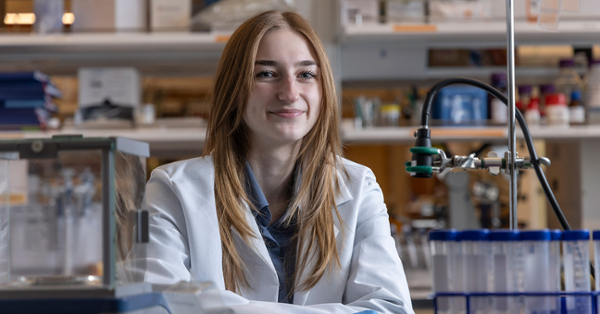Biomedical engineering major Hayley Jankowski receives prestigious NSF Graduate Research Fellowship
Biomedical engineering major Hayley Jankowski receives prestigious NSF Graduate Research Fellowship

Hayley Jankowski has been interested in biomedical research since her freshman year of high school. Now, the Rowan University biomedical engineering senior is pursuing that passion into graduate school as one of only 1,000 students nationwide to be accepted into the National Science Foundation's Graduate Research Fellowship Program for 2025.
Jankowski graduates this spring with her Bachelor of Science in biomedical engineering and a Certificate of Undergraduate Study in biomaterials engineering. When she begins her graduate studies in the bioengineering program at the University of Pennsylvania in the fall, the award will support her research in developing biomaterials to study cell-material interfaces.
During her undergraduate years at Rowan, Jankowski studied the way biomaterials can facilitate better processes for culturing stem cells in the Vega Lab, run by Sebastián Vega, Ph.D., associate professor of biomedical engineering in the Henry M. Rowan College of Engineering.
“Hayley has been an exceptional undergraduate researcher, demonstrating remarkable creativity and scientific insight,” Vega said. “Her work on developing new materials that maintain the therapeutic properties of stem cells addresses a major challenge in regenerative medicine and has rightfully earned her this prestigious fellowship.”
“This fellowship really helps solidify the confidence I have in myself as a researcher,” said Jankowski, a 22-year-old from Barnegat. “Being recognized for my abilities to be able to perform rigorous research that has the potential to make significant impacts is a great jump start to my career.”
Supporting regenerative medicine through biomaterials research
As an undergraduate student, Jankowski studied biomaterials that can facilitate better processes for culturing stem cells. Although stem cells hold great potential in the field of regenerative medicine, issues in culturing large quantities of these cells have held back the development of therapies for clinical use. The Food and Drug Administration has not yet approved any therapies based on mesenchymal stem cells, the type of adult stem cells Jankowski studies.
Currently, stem cells in labs are cultured on hard plastics that can alter the attributes of the cells, Jankowski explained.
“The stem cells can sense the stiffness of these plastics, and it makes them turn into different kinds of cells,” she said. To address this issue, she has conducted research on how “culturing stem cells on softer materials, like hydrogels that have additional signals added to them, can attenuate that stiffness to help the stem cells remain stem cells.”
This line of inquiry has broad applications, from facilitating the development of immunotherapies to paving the way for lab-grown organs and tissues. In addition to potential clinical applications, Jankowski’s research into stem cell manufacturing techniques will advance scientific knowledge of the relationship between materials and stem cells and serve as a foundation for her graduate research.
“Through this project, we get to learn more about the interactions that these cells have with the materials that they're cultured on, which can help us formulate other types of materials to influence different types of stem cell behaviors,” Jankowski said.
A prestigious fellowship award in an exceptionally competitive year
The NSF Graduate Research Fellowship has provided financial support for high-achieving graduate students in the STEM fields since 1952, contributing to the development of more than 75,000 early-career researchers.
The support and validation this program provided Jankowski has been meaningful, “especially since this year, there's been so many unknowns with regards to this type of funding,” she said.
In any year, the competition for the NSF Graduate Research Fellowship Program is considerable. More than 13,000 students apply annually, and the NSF typically awards just 2,000 fellowships. This year, the NSF reduced the number of fellowships awarded by half.
“Rowan biomedical engineering students’ first-hand experience in cutting-edge research and authentic experiential learning, like Hayley’s work in Dr. Vega’s lab, prepares students to be competitive in these prestigious opportunities and beyond,” according to Mary Staehle, Ph.D., professor and head of the Department of Biomedical Engineering.
Drawing skills from soccer, high school research and opportunities at Rowan
In addition to her achievements in the classroom, Jankowski credits other experiences throughout her life with shaping her path to success. Having played soccer since the age of four, she believes the skills she learned on the soccer field have also informed her research.
“Learning how to work with others, communicate with each other and come up with a game plan are all skills that translate really well into the lab,” she said.
Jankowski conducted her first individual research inquiry as a high school freshman, creating her own mineral sunscreen formulations using zinc oxide and titanium and studying their effectiveness in UVA and UVB protection. She presented her research at the Jersey Shore Science Fair, where it received second place in the medicine and health category, and at the Delaware Valley Science Fair.
“That experience served as my first glimpse into the world of research, specifically in the field of biomedical sciences, and helped me identify my passion for engineering and entrepreneurship,” Jankowski said.
After graduate school, she hopes to continue her biomaterials research in a leadership role in industry, focusing on the interactions between cells and materials and how to use this relationship to advance regenerative medicine.
Like many students, particularly young women in STEM fields, Jankowski remembers initially feeling some hesitation about getting involved in laboratory research as an undergraduate student.
“Imposter syndrome became a critical barrier for me when it came to entering university, especially as a woman interested in science and engineering,” Jankowski said. “Coming to Rowan as a sophomore and seeing all these people already inside labs and the professors actively encouraging undergraduate students to join them in their labs helped me become more confident. Transferring to Rowan has provided me with immense opportunities that allowed me to obtain this achievement.”